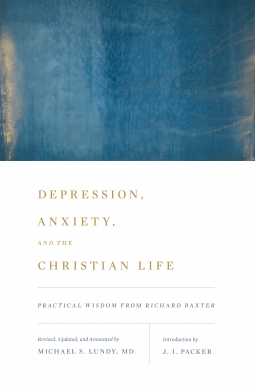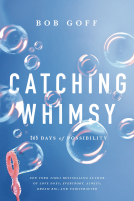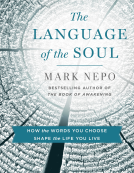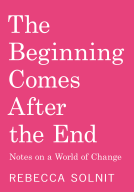
Depression, Anxiety, and the Christian Life
Practical Wisdom from Richard Baxter
by Michael S. Lundy, MD; Introduction
This title was previously available on NetGalley and is now archived.
Send NetGalley books directly to your Kindle or Kindle app
1
To read on a Kindle or Kindle app, please add kindle@netgalley.com as an approved email address to receive files in your Amazon account. Click here for step-by-step instructions.
2
Also find your Kindle email address within your Amazon account, and enter it here.
Pub Date Jul 31 2018 | Archive Date Jul 05 2018
Talking about this book? Use #DepressionanxietyandTheChristianLife #NetGalley. More hashtag tips!
Description
This book presents 17th-century pastor Richard Baxter’s wise, gentle advice to comfort and strengthen all who struggle with depression or know someone who does.
This book presents 17th-century pastor Richard Baxter’s wise, gentle advice to comfort and strengthen all who struggle with depression or know someone who does.
A Note From the Publisher
PDF may not be compatible with all reading devices.
Advance Praise
“Richard Baxter was a skilled psychologist as well as a theologian. In this book are some of his writings on depression. J. I. Packer is a modern theologian and lifelong student of Baxter. Michael Lundy is a clinical psychiatrist who has modernized the texts of Baxter. The result is an unusually instructive book of practical wisdom that will be a great help to pastors and others who are called to give counsel to the downcast.”
—Paul Helm, Professor of the History and Philosophy of Religion Emeritus, King’s College, London; author, The Providence of God
“Here you will find two treasures for the price of one: consultations with a practicing psychiatrist (Michael Lundy—who, by definition, is a ‘healer of the soul’) and a distinguished theologian (J. I. Packer—who especially loves authors whose theology engages what used to be called ‘the cure of souls’). But, in fact, it turns out to be three treasures for the price of one, as a doctor of medicine and a doctor of philosophy together highlight the wisdom of the remarkable pastor-theologian Richard Baxter. Depression, Anxiety, and the Christian Life is simultaneously a manual for pastors and counselors, a resource for study groups, and a thesaurus of wise spiritual counsel for those who struggle and for those who care about them. A few consultations with the soul-physician group of Packer, Lundy, and Baxter will be medicine for your soul!”
—Sinclair B. Ferguson, Chancellor’s Professor of Systematic Theology, Reformed Theological Seminary; Teaching Fellow, Ligonier Ministries
“A threefold cord is not quickly broken. In this book, J. I. Packer and Michael Lundy team up with the great Puritan Richard Baxter, who was truly a physician of souls, to offer Christians much-needed help on the thorny spiritual realities of depression and anxiety. Few, if any, Christians are unfamiliar with the pain of anxiety and depression. Few, if any, will fail to be immensely helped by the guidance offered in these pages.”
—Mark Jones, Teaching Elder, Faith Vancouver Presbyterian Church, Vancouver, British Columbia
Available Editions
| EDITION | Other Format |
| ISBN | 9781433542060 |
| PRICE | $19.99 (USD) |
Average rating from 6 members
Featured Reviews
 Tanya A, Reviewer
Tanya A, Reviewer
Today we hear all the time that depression and anxiety are getting worse and worse, that it is the malady of our informational age, that a long time ago people were in touch with the nature more and they were happier. I am not sure if that spin is a marketing move to sell anti depression drugs, but the real eye opener is that even 350 years ago depression was just as bad as it is now! They called it melancholy then, and Puritan pastor Richard Baxter spent many years on researching this issue. "Depression, Anxiety, and the Christian Life" is a great resource for the Christian believers that helps understand all the details and provides practical advice point by point on how to deal with the situation. The way it is described and the whole approach is completely different than what I would expect from a Puritan pastor, and my understanding was based on many negative points of view of the Puritans that are so common today. However, Richard Baxter was not a typical Puritan, and his views were not widely accepted at all at the time. He resorted to writing because he could not speak about it, which left us with his wonderful pastoral counsel.
J.I. Packer and Michael S Lundy have come together in this new book to reprint and update several of Richard Baxter's essays on depression aka MELANCHOLY. The sermons included are "Directions to the Melancholy about Their Thoughts" reprinted as "Advice to Depressed and Anxious Christians;" "The Cure of Melancholy and Overmuch Sorrow, By Faith" reprinted as "The Resolution of Depression and Overwhelming Grief Through Faith;" and "The Duty of Physicians" which appears in the appendix.
I don't know that I'd go so far as to say it is an annotated publication of Baxter's sermons. But they certainly go a long way towards making Baxter more accessible to modern readers. Commentary is provided to a certain degree in the foot-notes. Each author provides a chapter on Baxter as an introduction and to set the context for what follows. And context is key in whatever you're reading.
For example, Packer's introductory chapter states that,
"Three basic perspectives pervade all of Baxter’s practical writings, each a guideline toward spiritual well-being as he understood it. The first is the primacy of the intellect. All truth, so he says repeatedly, enters the soul via understanding. All motivation begins in the mind as one contemplates the realities and possibilities that draw forth affection and desire; all fellowship with Christ the Mediator also begins in the mind, with knowledge of his undying love and present risen life; all obedience begins in the mind, with recognition of revelation concerning his purpose and will. Calls to consider—to think, that is, and so get God’s truth clear first in one’s head and then in one’s heart—are accordingly basic to Baxter’s instruction. The second perspective is the unity of human life before the Lord. God made us to fulfill simultaneously two great commandments: to love God himself in his triune being, and to love our neighbor as we love ourselves. The third perspective is the centrality of eternity. Heaven and hell are realities, and the greatness of the human soul consists partly, at least, in the fact that we will never cease to be, but must inhabit one or the other of these destinations forever."
This will not only help readers place the essays or sermons in this book into context but moving beyond this book to his others as well. (I, for one, DO want to read Baxter now.)
Lundy's introductory chapter points out that Baxter was both a minister AND a physician. "Baxter wrote about the care of the soul and the care of the body as if they were indivisible if not indistinguishable components of the same person."
So. Are Baxter's sermons accessible? Are they relevant? To the first I answer yes. They've done a good job. As to the second question, I'm still thinking. The book does provide food for thought. Which is a good sign--almost always. In this case it's in a good way. I can confidently say that some big-picture ideas, some principles or themes, can be taken away from reading Baxter. The modern reader can benefit. How much they benefit will vary from reader to reader. But I can't honestly say that it works down to the little details flawlessly.
Baxter surprised me in a good way. I'll share just three of my favorite quotes.
"No sin that we hate more than we love shall condemn us, if we would rather leave and be delivered from it than keep it."
"Don’t waste your thoughts thinking about your thoughts...Making a great deal of every thought that enters your mind will keep those thoughts in your mind longer. For what we are most aware of we think most about. What we least regard we least remember."
"Faith is not divine faith if it does not depend upon divine revelation."
 Rocky W, Educator
Rocky W, Educator
Very good read for helping someone dealing with depression. The fact that Baxter was able to point to the fact that both the body and the soul need to be dealt with when dealing with depression. It seems all to easy for someone to be prescribed a medicine rather than asking the reasons for the onset of depression.
It was also refreshing to read Baxter's warning that solitude might be dangerous for the depressed person. Then explaining why that is the case, too much time to focus on the negative self-talk that the depressed person uses with themselves.
If you enjoy dipping into ancient texts to discover gems of our Christian heritage, this book is for you. To be clear, this is an updated version of writings from the seventeenth century. At first, I balked at reading such an old text, but I reminded myself I regularly read very old Christian texts just about every day. Just because a text is old doesn’t mean it isn’t packed with wisdom applicable to today.
Richard Baxter, a Puritan pastor, indeed wrote plenty of worth on the subject of what was then called “melancholy” which is still helpful today. Amazingly, Baxter long ago grasped the concepts of mind/body/soul connections and offered practical advice for those suffering from depression and anxiety in his day. Though he dispensed his advice long before the days of antidepressants, Baxter nonetheless advised those under his pastoral care to seek treatment from their own medical doctors first. But Baxter also understood that depression is not simply a physical ailment. While medicine can help, Baxter also addresses the Christian topics of hope, mercy, forgiveness, and joy. Equally important are his purely practical tips for those suffering garden variety anxiety and depression: don’t spend too much time alone, hang out with cheerful people, keep yourself occupied, try to focus on positive thoughts. In an age where we might be quick to address mild mental illness with a pill or a therapy session, these practical and everyday tips go a long way towards coping with depression on a daily basis.
This book would best appeal to priests, pastors, and other ministry professionals interested in pastoral care of those suffering anxiety and depression. Richard Baxter, according to this book, would be the first to recommend treating mental illness with medications and medical treatment. But he would also add to this treatment the fundamental practices and teachings of Christianity that heal the sick and comfort the hopeless.
 Julia B, Reviewer
Julia B, Reviewer
I was surprised at how much I both enjoyed and didn't enjoy this book. What I did enjoy was the updated version of Richard Baxter's essays on "melancholy" (depression) and his very practical and theologically sound advice. His understanding of this what is often understood as a "modern disease" centuries ago is profound.
What I didn't enjoy was the preamble from Packer and Lundy. While some introduction would have been good, it was a little repetitive, monotonous and lengthy.
Readers who liked this book also liked:
Jenny O'Brien
General Fiction (Adult), Historical Fiction, Women's Fiction


















